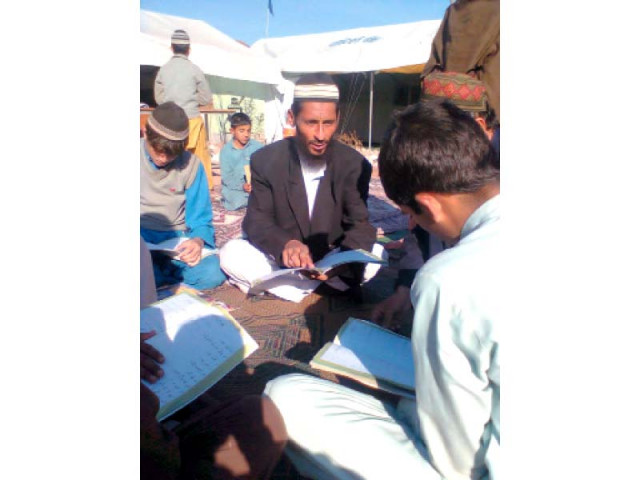Never say never: IDPs in Jalozai camp get another chance at school
An NGO has set up schools inside the camp and has designed a special course for grownups.

An IDP said that life is easier in the camp for those who are literate because they can fill out their own forms and do more tasks. PHOTO: EXPRESS
It’s never too late to go back to school. Something similar has dawned on the internally displaced tribesmen living in Jalozai camp, Nowshera.
Classes are being held in a tent inside the camp where about 15 tribesmen listen intently and are quick to take notes. Here, students’ ages range between 25 and 60 years
Jamil Khan, 28, a tribesman, is trying to make up for missing the opportunity to attain education during childhood. “In my childhood, I was not interested in school and my parents were illiterate. No one told me about the importance of education,” Jamil said.
Before arriving at the camp, Jamil was a pickup driver in Bara, Khyber Agency. He has been attending a school set up by Muslim Aid, a non-governmental organisation, inside the Jalozai camp. He was displaced following military action to drive out militants from the town three years ago. “I got tired with camp life because we had nothing to do,” he said.
Muslim Aid Education Officer Mohammad Arif said his organisation has established 20 schools that provide education from primary school till Matriculation. About 15 schools are dedicated for female students and five for males. Second shift classes are also provided for adults.
“Presently, about 900 adults are enrolled in these schools,” he said, adding that they designed a special course for grownups,” Arif said.
Jamil said he, like many others, faced difficulties in their village because the few schools that did exist were far away in other villages. “We had to walk long distances to get there,” he said. “Many tribesmen were not aware of the benefits of education and thought of those people that sent their children to school as wasting their time.”
“However, now there is a realisation that we wasted ourselves.”
Life is easier in the camp for those IDPs that are literate because they can fill out their own forms and do more tasks compared to the illiterate ones, he added.
The camp was first established for Afghan refugees who arrived in the 1980s during the Soviet invasion of Afghanistan.
Though the Afghan settlement was later demolished in 2008, Jalozai now houses IDPs who fled the militancy and military operations in the tribal areas. The camp is divided in different phases and could be tough to navigate through for an illiterate person, Jamil said.
Jamil now understands numbers and English alphabets after attending the school. If the situation in my hometown normalises, I will continue my education and will borrow money if I need it to educate my children in the future, he said.
Irshad Afridi, another student at the camp school, appreciated the hard work of teachers. “I can now understand the writings on billboards.”
Published in The Express Tribune, April 14th, 2013.



















COMMENTS
Comments are moderated and generally will be posted if they are on-topic and not abusive.
For more information, please see our Comments FAQ